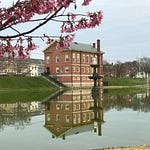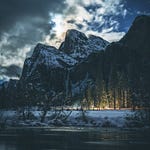Listen to The Saturday Stoke
For as long as I can remember the outside world, with its natural wonder, has spoken to me through its beauty, and all the different elements associated with it; elements such as delight, Joy, awe, dread, longing, and hope.
When I was boy, for example, I remember laying on my back beneath the ‘acorn tree’ trying to count all the green and yellow acorns. I felt them hard under my back as I looked up through the gangly limbs to the tiny patches of blue sky. I was only about seven, but I remember feeling like something or someone was watching through those gangly limbs. As if the blue patches were peeking eyes looking down on me from another place.
God to me was, somehow, the ‘acorn tree.’ And no, I’m not promoting pantheism. Just connecting my vivid boyhood memory of this wonderful tree I used to lie under as the acorns fell. And I remember feeling something very big in those moments looking up through the limbs. Can you remember moments like that when you were a child? For me, as I grew older, I would encounter God in places that also felt like my experience with that acorn tree.
Places like the sinkhole across the street from our church, with its shadows and scary corners, and sheer depth. In the nearby field of high grass—the grass with the spindly stalks that rose up and made a “V” at the end, dotted by little black seeds. Or, underneath the old oak tree out behind my dad’s church; the church my grandpap helped build. It was the same tree where my dad would carry out all the metal chairs and set them up for potluck, or sunrise services. The same tree we tried our strength against, climbing it and skinning our knees on the rough bark. Or there was the lake at 4 a.m. floating quietly with Dad, catching no fish, but catching the muted colors of the early Florida summer sun. The dirty sand of the Gulf coast and muddy shells and playing in the warm water. All these I remember as my “acorn tree moments,” my “God moments.”
The older I grew, my God moment with the ‘acorn tree’ looked like the glowing snow across the midnight fields of Lancaster Country Pennsylvania—the air dense with stars and indigo.
It also looked like the deer that walked through our snowy camp in the pine grove. Silently she passed through as I tended the coals while my brother and Jesse and Bobby slept in a heap of blankets inside a hole we dug in the snow. They never saw the deer, but I told them about her. Not sure if I told them how I saw God that morning, though.
Do you have memories like that? Like the ones I’m sharing with you now?
Memories of place and season and hot and cold and wonder and play and delight; memories that make you cry, that make you shudder, that still drum up a sense of awe in your bones. Beautiful memories you’ll never forget. The beauty we encounter throughout our lives carves itself into our memories. Feeling beauty is not just a passing experience. It is an encounter we take in with our eyes, and other senses. That vision moves us through life and connects our exploration of the very real world around us with the very world inside of us. Feeling beauty actually expands who we are as people and paints seasons of our lives with meaning.
The places we inhabit matter. They not only serve as the backdrop of our memories, they actually help form our memories and contribute to the Joy we experience daily. Land and place possess the power to nourish us; as caretakers and creators we serve ourselves and one another by preserving their beauty.
Subscribe to The Saturday Stoke Podcast
The land also teaches us. Some say this landscape of ours speaks. It has its own language. But what is it saying? Anne Whiston Spirn, a renowned landscape architect, says the language of landscape is “our native language.” She says the language of landscape can be spoken and read. “Landscapes are a vast library of literature,” she says. “And the library contains many genres like “worship, memory, play, movement, meeting, exchange, power, production, home, and community.” Parks, hills, and mountains, speak to us. They act as context for different times of our lives. And those contexts communicate meaning, like the memories I’ve just recounted; each a place, a context sacred to my experience. The deer and the fire weaved with the pine grove and the snow on that wintry Pennsylvania morning, creating a context for my experience. I remember the ‘acorn tree’ not only because of the vividness of the tree and sky, but because of the meaning now associated with my experience of holy wonder.
In all these places I experienced the wonder and varied mystery of beauty. These were meeting places, sacred places—“triggers for memory, the occasion of hope.”
Here’s a quick hack for finding these sacred places.
You can’t find them. They must find you. But the only way they will find you, is if you find yourself out among the natural world with all its created glory and mystery.
I did not find the sacredness of the ‘acorn tree,’ it found me. And it did so only years later as I reflected upon its impact in my memory. A “sacred place is not chosen,” says theologian Belden Lane, “it chooses.” And I find this to be the way of it. How many times have I walked a path, or lingered in a park, or ridden on the same mountain trail over and over until all at once I’m overcome with some kind of holy experience? Was I not paying attention the first time? Was my imagination dull upon the landscape, seeing only the material elements in front of me? Dirt, sand, rocks, trees, shrubs, grass? Professor Lane says, "We are surrounded by a world that talks, but we don't listen. We are part of a community engaged in a vast conversation, but we deny our role in it."
I think of the Psalmist who writes, “The earth is the Lord’s, and everything in it, the world, and all who live in it … How many are your works, Lord! In wisdom you made them all.” Perhaps this is what the English poet Gerard Manly Hopkins was thinking about when he wrote, “The world is charged with the grandeur of God.”
You see, my friends, we were not created to live life shuddered up inside four walls and a roof. God had us in mind when he spoke trees into existence, when he forged mountains from the earth, when he cut valleys with the rivers of his imagination. If you want to enliven your days, don’t spend them with the confines of a building or some virtual world. Spend them out among the sacred spaces.
If I’ve learned anything in my love for the outside world, it is that I must actually go outside. I must push away from the routine, that usually consists of going back and forth between man-made buildings in man-made automobiles. I must step out in the rain every now and again. I must walk in the hills during a storm. I must take a trail alone in the mountains.
If I don’t, I will not hear the language of the landscape, the language of beauty, the language of God. And if I isolate myself from other people, and from trees, and hills, and mountains long enough, my ears will shut up and I will become deaf to the language God intended for the nourishment of my heart. I will live in a muted world of my own.
We get our word “idiot” from the Latin idios; it means one’s own, personal or distinct. It can also mean an ignorant person; someone who cuts themselves off from the learning all around them. I suppose that if I cut myself off from the outside world with its language of wonder, I will have become an idiot: alone, separate, ignorant. And I do not want that for myself, or my family.
I want to walk out among people playing chess in the park. I want to hear the wind sway the tree tops on the hills. I want the heights to teach me their strength. I want to collect enough moments out in the landscape so that I can more fully understand the character of God.
So get outside and seek out the memories waiting to be made. And, as alway, stay stoked my friends.
Join The Edges Family
And stay perpetually stoked.
Email Address Sign Up
Great content. Half the calories.
Buckle-up buttercup.

















Share this post